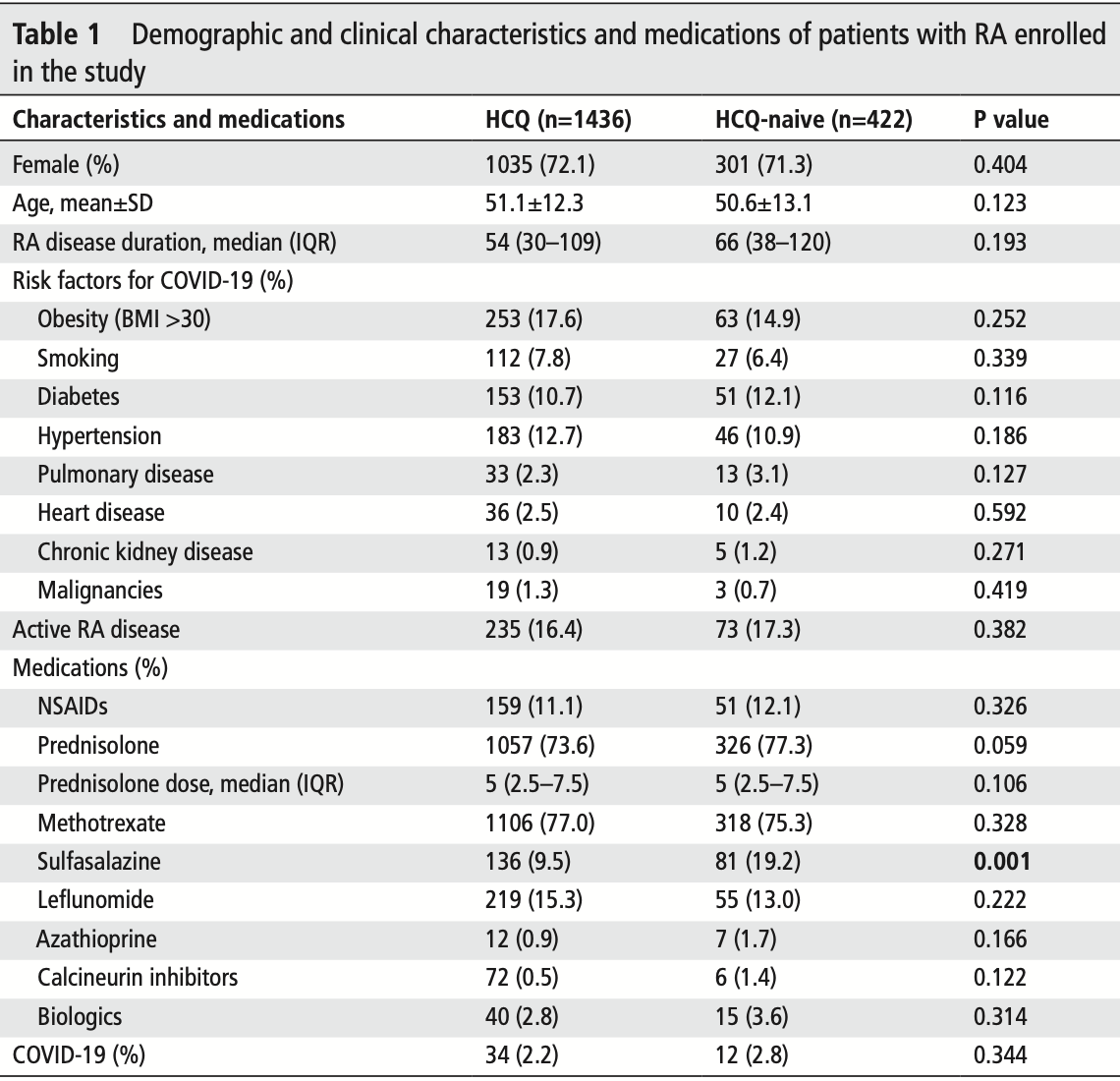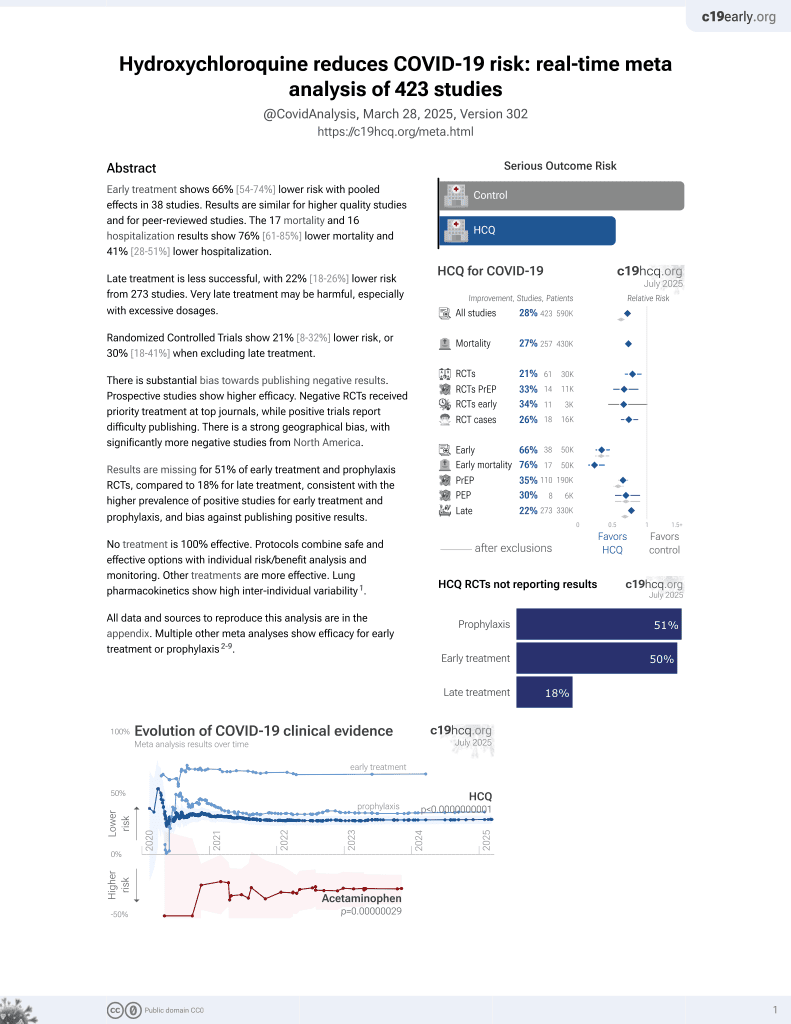
Prevalence of COVID-19 in patients with rheumatoid arthritis (RA) already treated with hydroxychloroquine (HCQ) compared with HCQ-naive patients with RA: a multicentre cross-sectional study
et al., Postgraduate Medical Journal, doi:10.1136/postgradmedj-2020-139561, Jan 2021
HCQ for COVID-19
1st treatment shown to reduce risk in
March 2020, now with p < 0.00000000001 from 424 studies, used in 59 countries.
No treatment is 100% effective. Protocols
combine treatments.
6,400+ studies for
210+ treatments. c19early.org
|
Survey analysis of 1,858 RA patients in Iran, showing no significant difference in cases with HCQ prophylaxis.
|
risk of case, 16.7% lower, RR 0.83, p = 0.59, treatment 34 of 1,436 (2.4%), control 12 of 422 (2.8%), NNT 210.
|
| Effect extraction follows pre-specified rules prioritizing more serious outcomes. Submit updates |
Khoubnasabjafari et al., 13 Jan 2021, retrospective, Iran, peer-reviewed, 10 authors.
Abstract: Prevalence of COVID-19 in
patients with rheumatoid
arthritis (RA) already
treated with
hydroxychloroquine (HCQ)
compared with HCQ-naive
patients with RA: a
multicentre cross-
sectional study
COVID-19 is becoming the most serious
problem of human society after World
War II. The general recommendations of
WHO, which include wearing mask, social
distancing, washing hands and so on, are
a widely accepted approach to preventing
the spread of the virus. With lack of effective treatment, prophylactic strategies
have attracted the attention of healthcare
providers. Chemoprophylaxis is one of
these strategies. Several in vitro studies
showed that antimalarial agents interfere
with the proliferation of various viruses,
including the severe acute respiratory
syndrome coronavirus, by inhibiting virus/
cell fusion.1 However, the main challenge
is translating the impact of in vitro models
to clinics. Given the higher mortality of
patients with COVID-19 with autoimmune diseases,2 we decided to investigate the efficacy of these medications by
evaluating the incidence of COVID-19 in
patients with rheumatoid arthritis (RA)
already treated with hydroxychloroquine (HCQ) compared with HCQ-naive
patients with RA.
In a multicentre cross-
sectional study,
patients with RA treated in the rheumatology clinics of the Tabriz University of
Medical Sciences, Kashan University of
Medical Sciences and Army Hospital of
Tehran were recruited. For a period of 4
weeks from 19 August to 19 September
2020, data about symptoms suggestive
of COVID-19 were obtained by telephone interview. Inclusion criteria were
fulfilment of the American College of
Rheumatology/European League Against
Rheumatism (ACR/EULAR) classification
criteria for RA, disease onset at age ≥16
and disease onset before the COVID-19
outbreak. Exclusion criteria were change
or addition of new disease-modifying antirheumatic drugs during the last 8 months,
non-adherence to medication, refusal to
answer the questions and non-response to
Table 1 Demographic and clinical characteristics and medications of patients with RA enrolled
in the study
Characteristics and medications
HCQ (n=1436)
HCQ-naive (n=422)
P value
Female (%)
1035 (72.1)
301 (71.3)
0.404
Age, mean±SD
51.1±12.3
50.6±13.1
0.123
RA disease duration, median (IQR)
54 (30–109)
66 (38–120)
0.193
Obesity (BMI >30)
253 (17.6)
63 (14.9)
0.252
Smoking
112 (7.8)
27 (6.4)
0.339
Diabetes
153 (10.7)
51 (12.1)
0.116
Hypertension
183 (12.7)
46 (10.9)
0.186
Pulmonary disease
33 (2.3)
13 (3.1)
0.127
Heart disease
36 (2.5)
10 (2.4)
0.592
Chronic kidney disease
13 (0.9)
5 (1.2)
0.271
Malignancies
19 (1.3)
3 (0.7)
0.419
Active RA disease
235 (16.4)
73 (17.3)
0.382
NSAIDs
159 (11.1)
51 (12.1)
0.326
Prednisolone
1057 (73.6)
326 (77.3)
0.059
Prednisolone dose, median (IQR)
5 (2.5–7.5)
5 (2.5–7.5)
0.106
Methotrexate
1106 (77.0)
318 (75.3)
0.328
Sulfasalazine
136 (9.5)
81 (19.2)
0.001
Leflunomide
219 (15.3)
55 (13.0)
0.222
Azathioprine
12 (0.9)
7 (1.7)
0.166
Calcineurin inhibitors
72 (0.5)
6 (1.4)
0.122
Biologics
40 (2.8)
15 (3.6)
0.314
COVID-19 (%)
34 (2.2)
12 (2.8)
0.344
Risk factors for COVID-19 (%)
Medications (%)
*p<0.05 considered significant.
BMI, body mass index; HCQ, hydroxychloroquine; NSAIDs, non-steroidal anti-inflammatory drugs; RA, rheumatoid
arthritis.
Postgrad Med J Month 2021 Vol 0 No 0
three phone calls. Patients with..
DOI record:
{
"DOI": "10.1136/postgradmedj-2020-139561",
"ISSN": [
"0032-5473",
"1469-0756"
],
"URL": "http://dx.doi.org/10.1136/postgradmedj-2020-139561",
"alternative-id": [
"10.1136/postgradmedj-2020-139561"
],
"author": [
{
"affiliation": [],
"family": "Khoubnasabjafari",
"given": "Maryam",
"sequence": "first"
},
{
"affiliation": [],
"family": "Jouyban",
"given": "Abolghasem",
"sequence": "additional"
},
{
"affiliation": [],
"family": "Malek Mahdavi",
"given": "Aida",
"sequence": "additional"
},
{
"affiliation": [],
"family": "Namvar",
"given": "Leila",
"sequence": "additional"
},
{
"affiliation": [],
"family": "Esalatmanesh",
"given": "Kamal",
"sequence": "additional"
},
{
"affiliation": [],
"family": "Hajialilo",
"given": "Mehrzad",
"sequence": "additional"
},
{
"affiliation": [],
"family": "Dastgiri",
"given": "Saeed",
"sequence": "additional"
},
{
"affiliation": [],
"family": "Soroush",
"given": "Mohsen",
"sequence": "additional"
},
{
"affiliation": [],
"family": "Safiri",
"given": "Saeid",
"sequence": "additional"
},
{
"ORCID": "http://orcid.org/0000-0002-9482-6967",
"affiliation": [],
"authenticated-orcid": false,
"family": "Khabbazi",
"given": "Alireza",
"sequence": "additional"
}
],
"container-title": [
"Postgraduate Medical Journal"
],
"content-domain": {
"crossmark-restriction": true,
"domain": [
"bmj.com"
]
},
"created": {
"date-parts": [
[
2021,
1,
13
]
],
"date-time": "2021-01-13T19:10:59Z",
"timestamp": 1610565059000
},
"deposited": {
"date-parts": [
[
2022,
3,
1
]
],
"date-time": "2022-03-01T10:28:23Z",
"timestamp": 1646130503000
},
"indexed": {
"date-parts": [
[
2022,
3,
1
]
],
"date-time": "2022-03-01T11:13:02Z",
"timestamp": 1646133182234
},
"is-referenced-by-count": 0,
"issn-type": [
{
"type": "print",
"value": "0032-5473"
},
{
"type": "electronic",
"value": "1469-0756"
}
],
"issue": "e2",
"issued": {
"date-parts": [
[
2022,
3
]
]
},
"journal-issue": {
"issue": "e2",
"published-online": {
"date-parts": [
[
2022,
3,
1
]
]
},
"published-print": {
"date-parts": [
[
2022,
3
]
]
}
},
"language": "en",
"license": [
{
"URL": "https://bmj.com/coronavirus/usage",
"content-version": "tdm",
"delay-in-days": 0,
"start": {
"date-parts": [
[
2022,
3,
1
]
],
"date-time": "2022-03-01T00:00:00Z",
"timestamp": 1646092800000
}
}
],
"link": [
{
"URL": "https://syndication.highwire.org/content/doi/10.1136/postgradmedj-2020-139561",
"content-type": "unspecified",
"content-version": "vor",
"intended-application": "similarity-checking"
}
],
"member": "239",
"original-title": [],
"page": "e92-e93",
"prefix": "10.1136",
"published": {
"date-parts": [
[
2022,
3
]
]
},
"published-online": {
"date-parts": [
[
2022,
3,
1
]
]
},
"published-print": {
"date-parts": [
[
2022,
3
]
]
},
"publisher": "BMJ",
"reference": [
{
"DOI": "10.1136/bmj.m1432",
"doi-asserted-by": "publisher",
"key": "2022030102251472000_98.e2.e92.1"
},
{
"article-title": "Risk of death among people with rare autoimmune diseases compared to the general population in England during the 2020 COVID-19 pandemic",
"author": "Peach",
"journal-title": "Rheumatology",
"key": "2022030102251472000_98.e2.e92.2",
"year": "2020"
},
{
"DOI": "10.1056/NEJMoa2016638",
"doi-asserted-by": "publisher",
"key": "2022030102251472000_98.e2.e92.3"
},
{
"article-title": "A cluster-randomized trial of hydroxychloroquine for prevention of Covid-19",
"author": "Mitjà",
"first-page": "1",
"journal-title": "N Engl J Med",
"key": "2022030102251472000_98.e2.e92.4",
"volume": "24",
"year": "2020"
},
{
"article-title": "Hydroxychloroquine pre-exposure prophylaxis for COVID-19 in healthcare workers",
"author": "Revollo",
"journal-title": "J Antimicrob Chemother",
"key": "2022030102251472000_98.e2.e92.5",
"year": "2020"
}
],
"reference-count": 5,
"references-count": 5,
"relation": {},
"resource": {
"primary": {
"URL": null
}
},
"score": 1,
"short-container-title": [
"Postgrad Med J"
],
"short-title": [],
"source": "Crossref",
"subject": [
"General Medicine"
],
"subtitle": [],
"title": [
"Prevalence of COVID-19 in patients with rheumatoid arthritis (RA) already treated with hydroxychloroquine (HCQ) compared with HCQ-naive patients with RA: a multicentre cross-sectional study"
],
"type": "journal-article",
"update-policy": "http://dx.doi.org/10.1136/crossmarkpolicy",
"volume": "98"
}
